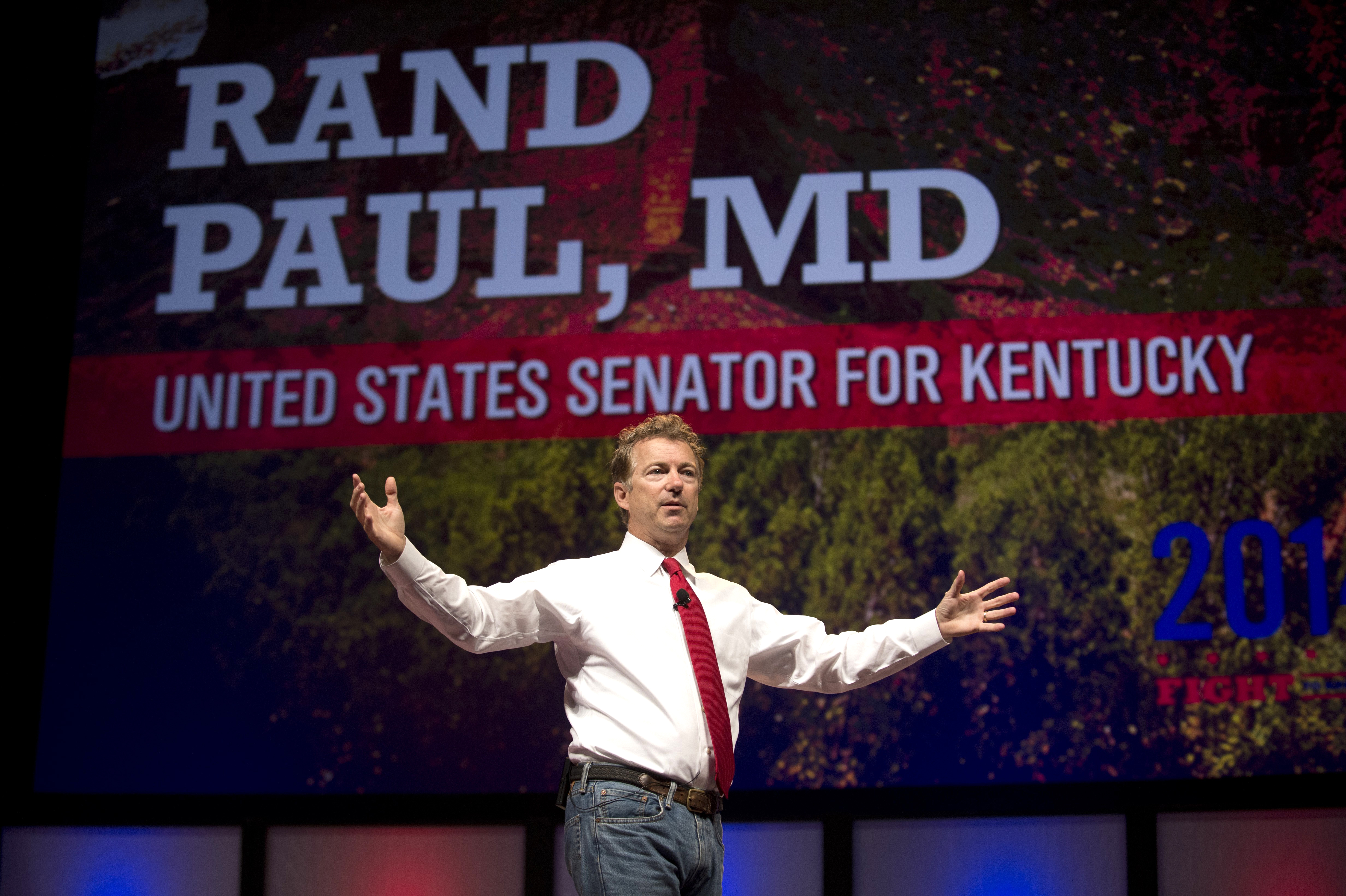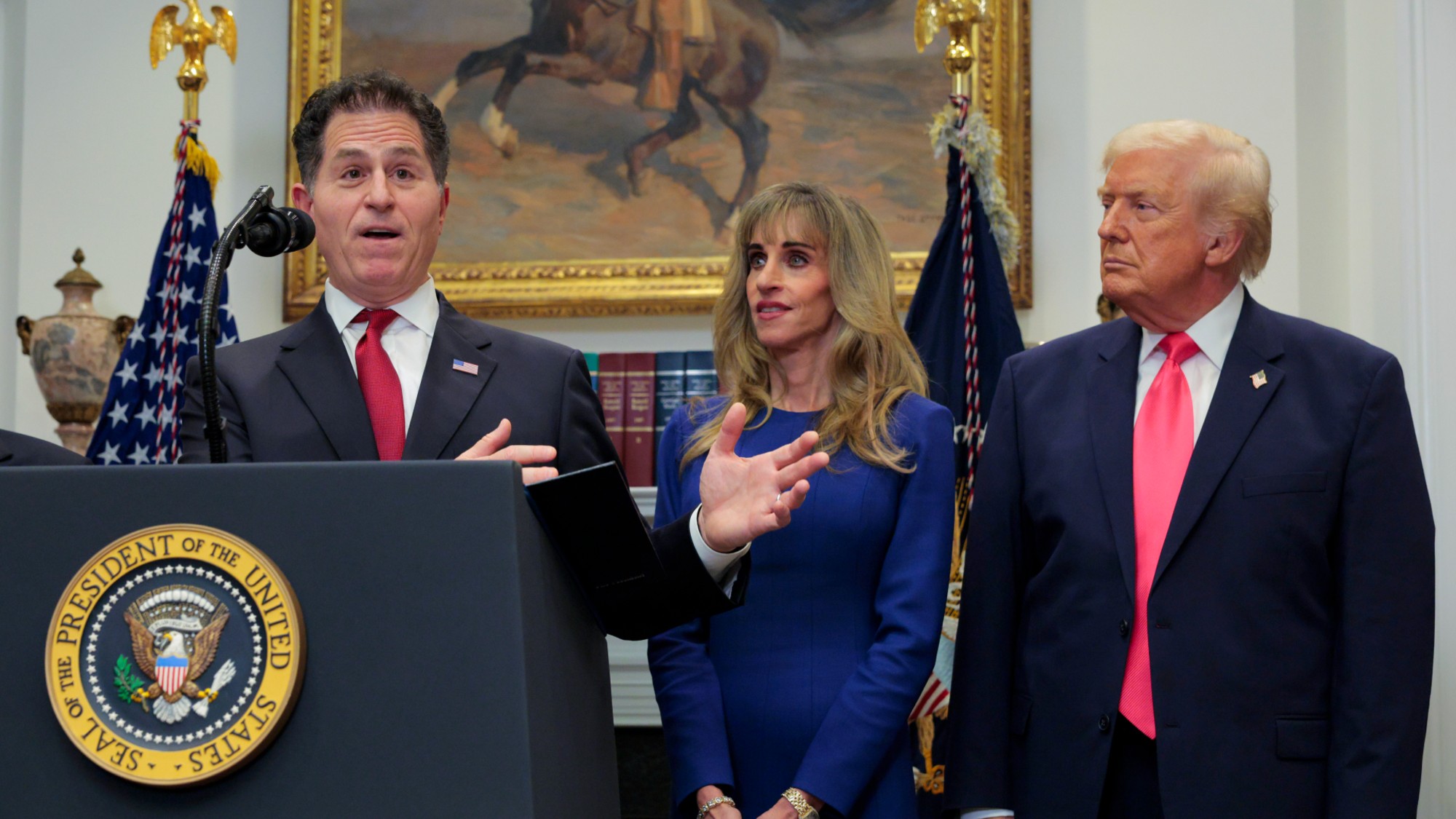Rand Paul's path to the nomination
Guns, libertarians, and authenticity are the keys


Where his Republican rivals draw attention to themselves with a tuba or a trumpet, Rand Paul puffs his Highland bagpipe. This analogy has little to do with his support for medical marijuana: Paul's sound is so different, it's compelling.
As his probable presidential campaign moves forward, don't lump him in with the conventionally conservative gadflies — former Gov. Mike Huckabee, Sen. Ted Cruz, or former Sen. Rick Santorum. The major activists and donors who chase those candidates are Paul skeptics.
But he's not a governor (or former governor) with executive experience and a reputation for governing, like Jeb Bush, Mitt Romney, or Chris Christie. And aside from iconoclastic libertarian millionaires, the party's moneyed interests don't think Paul can win, don't like his unorthodox economic views, and won't give them their money. The party's national security poobahs think he's dangerous.
The Week
Escape your echo chamber. Get the facts behind the news, plus analysis from multiple perspectives.

Sign up for The Week's Free Newsletters
From our morning news briefing to a weekly Good News Newsletter, get the best of The Week delivered directly to your inbox.
From our morning news briefing to a weekly Good News Newsletter, get the best of The Week delivered directly to your inbox.
His uniqueness is his major asset and largest liability. He's easily the most authentic-seeming Republican out there, with his direct challenges to party leaders on issues (and not just on tactics, which is what Ted Cruz does).
Paul could very well be the candidate who is left standing after the other two groups engage in ritual fratricide. (He could win New Hampshire this way.) The media appreciates his attention to racial inequality, his refreshing candor about his fellow candidates, and even his policy inconsistencies, which he's not terribly concerned about resolving.
Or he could be a mere flavor of the month, buoyed by an early win or two in the primaries but never able to replicate the experience in later contests. He might never grow his base of support. His floor might be his ceiling.
So Paul has to work hard to discredit the other candidates. He has to convince Republicans who share his views on foreign policy — and many of them do — that he is electable, that he's sincere andresponsible. He will be the race's biggest bombthrower because he stands to benefit most from the carnage.
A free daily email with the biggest news stories of the day – and the best features from TheWeek.com
Here's where marijuana comes in. Well, not pot, really. But guns, freedom, get government off my back; with those mantras, he will appeal to western conservatives and rural Republicans who aren't activists. He won't get the NRA's sole endorsement, but he might be able to get its members to campaign for him. And in smaller states, there might be enough libertarians on college campuses for him to pulse up his support at caucuses and conventions.
National Journal says he's like a door-to-door salesman. And that's right. Paul is not a natural fit for the party. His challenge is to remain distinctive at the same time he's establishing a comfort level with other Republicans.
That's why he's still figuring out whether he wants to run as something else — a Reagan conservative, a Tea Partier, an insurgent — or as Rand Paul, a canvas of sorts onto which Republicans can paint in the gaps.
Winning the nomination won't be easy for Paul, but he has a theory to prosecute, and it's not a bad one.
Marc Ambinder is TheWeek.com's editor-at-large. He is the author, with D.B. Grady, of The Command and Deep State: Inside the Government Secrecy Industry. Marc is also a contributing editor for The Atlantic and GQ. Formerly, he served as White House correspondent for National Journal, chief political consultant for CBS News, and politics editor at The Atlantic. Marc is a 2001 graduate of Harvard. He is married to Michael Park, a corporate strategy consultant, and lives in Los Angeles.
-
 Can Mike Johnson keep his job?
Can Mike Johnson keep his job?Today's Big Question GOP women come after the House leader
-
 A postapocalyptic trip to Sin City, a peek inside Taylor Swift’s “Eras” tour, and an explicit hockey romance in December TV
A postapocalyptic trip to Sin City, a peek inside Taylor Swift’s “Eras” tour, and an explicit hockey romance in December TVthe week recommends This month’s new television releases include ‘Fallout,’ ‘Taylor Swift: The End Of An Era’ and ‘Heated Rivalry’
-
 ‘These accounts clearly are designed as a capitalist alternative’
‘These accounts clearly are designed as a capitalist alternative’Instant Opinion Opinion, comment and editorials of the day
-
 Has Zohran Mamdani shown the Democrats how to win again?
Has Zohran Mamdani shown the Democrats how to win again?Today’s Big Question New York City mayoral election touted as victory for left-wing populists but moderate centrist wins elsewhere present more complex path for Democratic Party
-
 Millions turn out for anti-Trump ‘No Kings’ rallies
Millions turn out for anti-Trump ‘No Kings’ ralliesSpeed Read An estimated 7 million people participated, 2 million more than at the first ‘No Kings’ protest in June
-
 Ghislaine Maxwell: angling for a Trump pardon
Ghislaine Maxwell: angling for a Trump pardonTalking Point Convicted sex trafficker's testimony could shed new light on president's links to Jeffrey Epstein
-
 The last words and final moments of 40 presidents
The last words and final moments of 40 presidentsThe Explainer Some are eloquent quotes worthy of the holders of the highest office in the nation, and others... aren't
-
 The JFK files: the truth at last?
The JFK files: the truth at last?In The Spotlight More than 64,000 previously classified documents relating the 1963 assassination of John F. Kennedy have been released by the Trump administration
-
 'Seriously, not literally': how should the world take Donald Trump?
'Seriously, not literally': how should the world take Donald Trump?Today's big question White House rhetoric and reality look likely to become increasingly blurred
-
 Will Trump's 'madman' strategy pay off?
Will Trump's 'madman' strategy pay off?Today's Big Question Incoming US president likes to seem unpredictable but, this time round, world leaders could be wise to his playbook
-
 Democrats vs. Republicans: who are US billionaires backing?
Democrats vs. Republicans: who are US billionaires backing?The Explainer Younger tech titans join 'boys' club throwing money and support' behind President Trump, while older plutocrats quietly rebuke new administration
